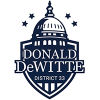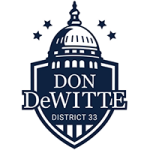Legislation to Keep an Eye On During Final Stretch of Session
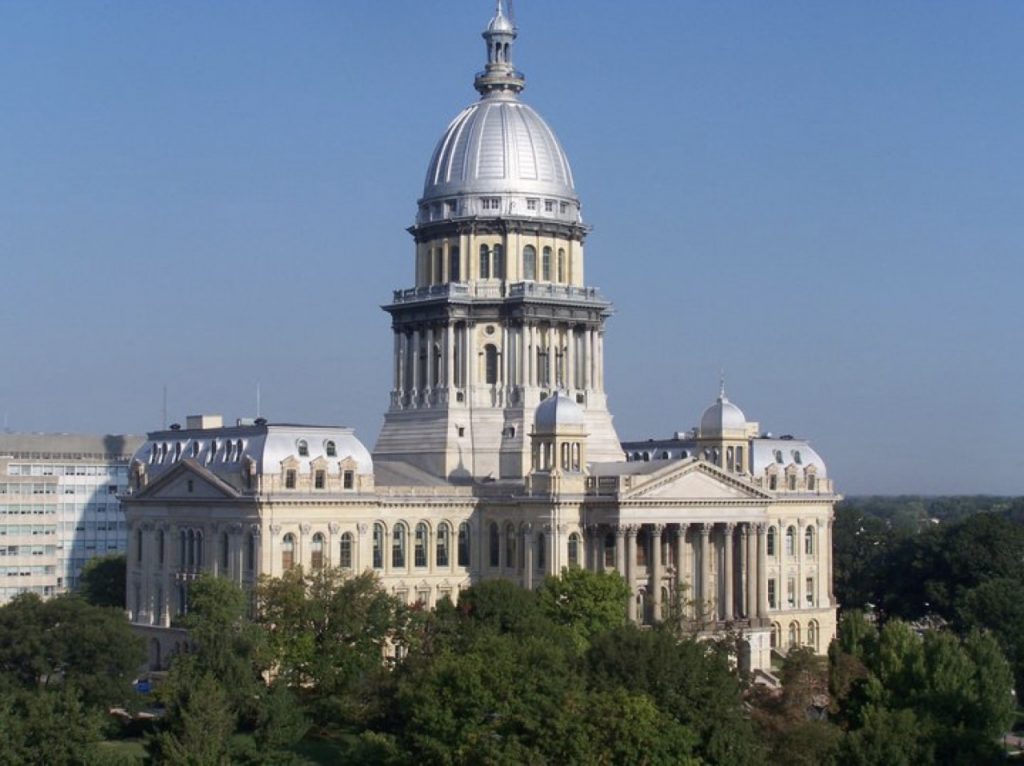
With adjournment set for Friday, May 19, lawmakers head back to Springfield this week for the final five-week stretch of the spring legislative session. The first two items in this newsletter highlight some measures sponsored by Democrats this year and others sponsored by Republicans.
Despite the many good ideas, proposals, and legislation that have been introduced to help make Illinois a better state to live, work, and raise a family, there are some bills that seem to miss the mark when it comes to what Illinois’ priorities should be. Below is a list of some “not-so-good” bills to keep an eye on during the last few weeks of session. All are sponsored by Democrats.
Senate Bill 182: Limits local control by permitting the Illinois Department of Public Health to control local health departments during a pandemic in which the Governor has issued a Disaster Declaration. This paves the way for “one-size-fits-all” mandates.
Senate Bill 1345: Allows noncitizens of the United States to register and vote in school board elections.
Senate Bill 1483: Allows inmates of a correctional facility, including those convicted of a felony, the ability to vote in elections despite the Illinois Constitution stating, “A person convicted of a felony, or otherwise under sentence in a correctional institution or jail, shall lose their right to vote, which right shall be restored not later than upon completion of his (her) sentence.”
Senate Bill 1556: Sets Illinois up for a ban on gas cars by allowing the Environmental Protection Agency (EPA) to establish rules to reduce carbon intensity from on-road transportation.
Senate Bill 2348: Through an unfunded mandate that adds to the length of a school day, it requires school districts to provide 20 minutes of relaxation activities per week, such as yoga, meditation, or stretching, in addition to and not replacing recess.
Senate Republicans Highlight Pro-Business Legislative Agenda
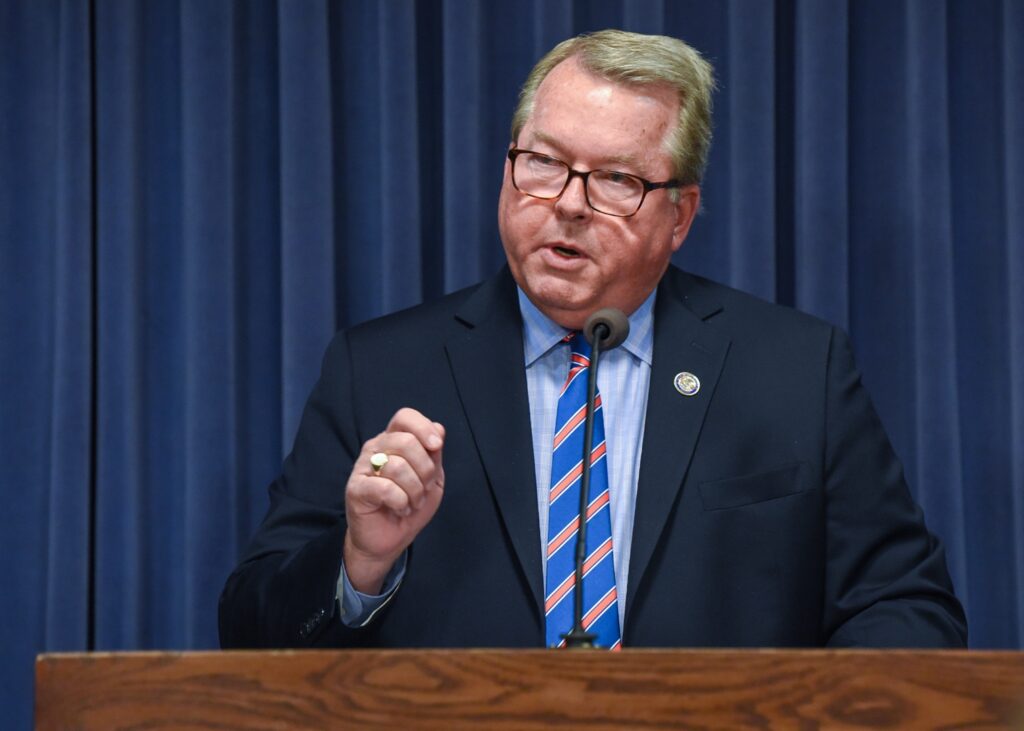
As Illinois’ unfriendly business climate continues to push large companies like Boeing, Caterpillar, Stellantis, and Tyson Foods to leave the state or significantly reduce their corporate presence, this morning I joined four other members of the Senate Republican Caucus to highlight a package of business advocacy initiatives that would help Illinois better compete, create jobs and boost its economy.
This year I filed several pieces of legislation that would support job creators and spur innovation. At the press conference, I shared a few of them, including:
- Senate Bill 163: Through this bill, we are seeking to provide corporate manufacturers with enhanced incentives to invest more in research and development of new products. Rather than receiving a tax incentive benefit once every three years, as per current law, this legislation would return to manufacturers, via a tax credit on an annual basis, a higher percentage of their invested dollars. Not only would this legislation reduce state tax liabilities for manufacturing companies that engage in research and development for new products, but it would help increase market value, business revenues, and most importantly, jobs.
- Senate Bill 2084: Similar to SB 163, this bill seeks to incentivize privately-held businesses to grow and thrive in Illinois. Through an innovation tax credit tied to research expenses for projects like new computer modeling technology, new 3-D modeling or imaging technology, and new public infrastructure and design, we are aligning Illinois income tax statutes with the federal tax law. If approved, SB 2084 will allow these business owners to more quickly recover dollars invested in research and development.
Other bills highlighted in the Senate Republican’s pro-business package include:
- Senate Bill 1810: removes the $100,000 cap on the Net Operating Loss (NOL) deductions on December 31, to help businesses invest and grow their organizations without revenue loss to the state.
- Senate Bill 1406: makes good on the repeal of the franchise tax that the governor and Democratic Majority agreed to and then reneged on in 2021. The franchise tax includes three different taxes on money used to build a business as opposed to revenue or even net worth. Illinois is in the minority of states that impose such a tax.
- Senate Bill 2140: reduces the filing fee for Limited Liability Corporations (LLCs) by 50 percent.
- Senate Bill 140: eliminates the Estate Tax for persons dying on or after the effective date or for transfers made on or after the effective date; also eliminates the Generation-Skipping Estate Tax.
- Senate Bill 2075: supports and retains the states’ legacy businesses by creating a legacy tax credit for companies headquartered in Illinois, along with employee tax credits.
Rather than putting laws in place that push our job creators to take their business and jobs to other, more business-friendly states, we need to support them. We don’t just want businesses to locate in Illinois; we should incentivize them to grow and thrive here. By unleashing the entrepreneurial spirit through these measures, we are encouraging individuals and corporations with great ideas to act, launch, and expand businesses right here in Illinois.
33rd District Youth Advisory Council Meets
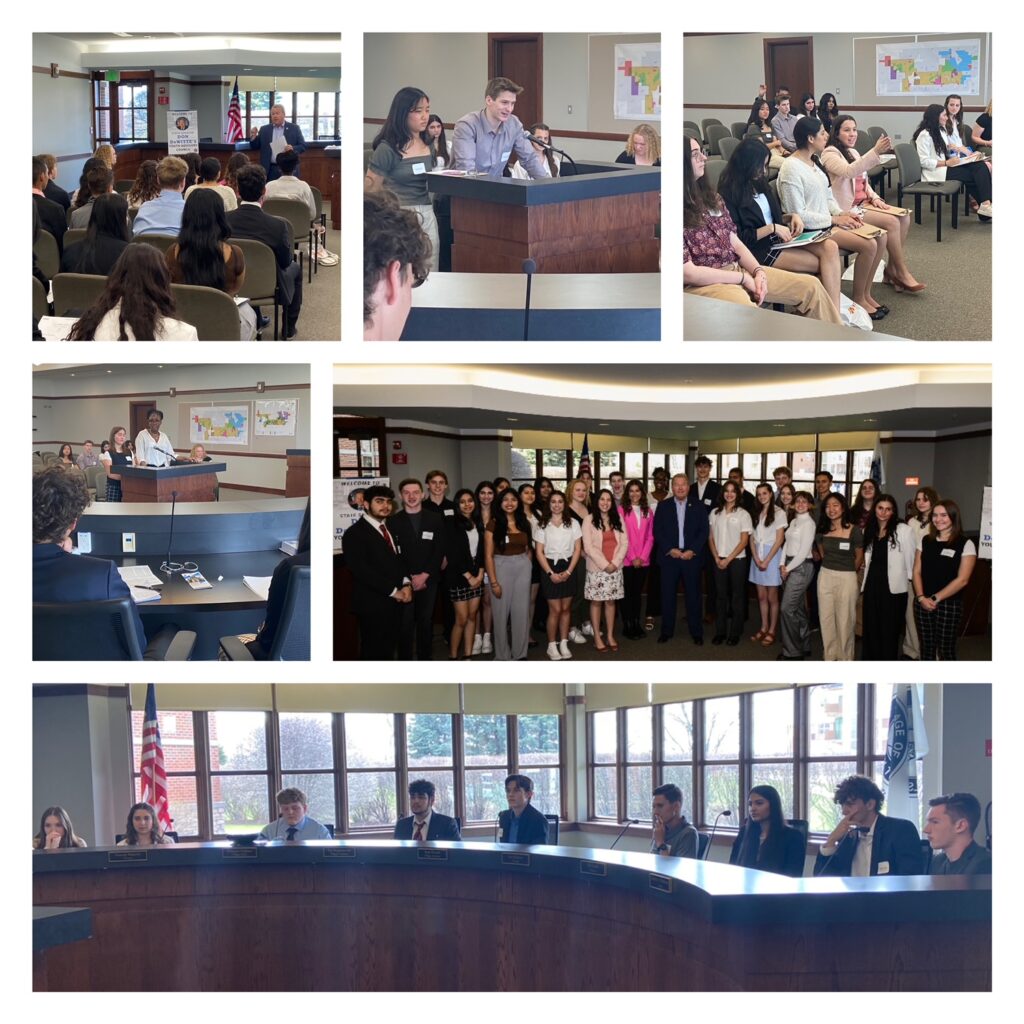
Last week it was my privilege to host high school students from across the 33rd District for my Spring Youth Advisory Council. Students who were recommended for the program by teachers and school counselors attended the all-day event on April 14 at the Lake in the Hills Village Hall. Participating schools included Burlington Central, Hampshire, Jacobs, St. Charles East and St. Charles North High Schools, and Compass Academy.
The group of students heard from three guest speakers who explained their path into different areas of public service, and each offered periods of Q and A for students. But the highlight of the day was a mock legislative session, where students were assigned various legislative roles, and they moved a school safety bill through a mock committee process.
It was a wonderful and engaging day, and the students brought great insights into conversations. This group has a bright future, and I cannot thank them enough for participating.
Illinois Gun Ban Law Heard in Federal Court
Last week, oral arguments began in a federal district court in East St. Louis over the constitutionality of Illinois’ new assault weapons ban law. The case is a consolidation of several lawsuits filed by groups including the Illinois State Rifle Association.
On the plaintiff’s side, attorneys argued that the U.S. Supreme Court has recently set the standard for what is considered “arms” in the Second Amendment, and that semi-automatics are arms in common use and are therefore protected by the Bill of Rights. The Illinois Attorney General representing the State, however, argued that because of technological advancement, the banned firearms are more advanced than what the framers of the U.S. Constitution intended to protect with the Second Amendment.
The start of the hearing is timely, as Monday marked the beginning of another phase of the gun ban taking effect. As of this week, citizens can no longer purchase certain magazines and if found in noncompliance can face a petty offense charge with up to a $1,000 fine. Noncompliant firearms, however, can face a Class A misdemeanor for a first offense and a Class 3 felony charge for subsequent offenses.
Tax Season Comes to a Close
If you haven’t already filed your 2022 taxes, now is the time to do so as the deadline is fast approaching. Earners have until Tuesday, April 18 to file both federal and state taxes.
As you are preparing your taxes, the Illinois CPA Society is warning of the most common tax-filing mistakes to avoid.
One of the biggest mistakes taxpayers can make is in the personal information section. A misspelled name, incorrect Social Security/tax ID number, or forgetting to update a changed direct deposit account can result in delayed acceptance of your return or the IRS rejecting it entirely. This would result in a delayed tax return if you were owed money, or a monthly penalty added to your tax bill plus any incurred interest.
Additional areas to pay attention to are your income and the credits and deductions sections. If your income does not match what the government has on file, at best the government will request more information from you, and at worst you will be fined. Most earned income will generate a form for you to use to prepare your tax returns, however, you are responsible for reporting some forms of taxable income on your taxes. Meanwhile, it is often challenging to keep the requirements for credits and deductions straight, so be sure to check through each option closely and provide proof when necessary.
One last easily confused area of taxes is investments. Financial institutions are required to provide this information on a regulated form, however, much like personal income there are some investments that are self-reported. Not only should you be careful of underreporting your investments to avoid penalties, but you also need to be aware of which transactions have already been reported so that you are not overreporting on yourself.
